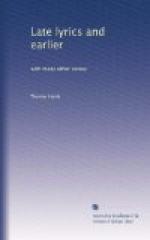You would lay roses,
Fifty years thence, on her monument, that discloses
Its graying shape upon the luxuriant green; Fifty
years thence to an hour, by chance led there, What
might have moved you?—yea, had you foreseen
That on the tomb of the selfsame one, gone where The
dawn of every day is as the close is,
You would lay roses!
1920.
THE CHAPEL-ORGANIST (A.D. 185-)
I’ve been thinking it through, as I play here to-night, to play never again, By the light of that lowering sun peering in at the window-pane, And over the back-street roofs, throwing shades from the boys of the chore In the gallery, right upon me, sitting up to these keys once more . . .
How I used to hear tongues ask, as I sat here when
I was new:
“Who is she playing the organ? She touches
it mightily true!”
“She travels from Havenpool Town,” the
deacon would softly speak,
“The stipend can hardly cover her fare hither
twice in the week.”
(It fell far short of doing, indeed; but I never told,
For I have craved minstrelsy more than lovers, or
beauty, or gold.)
’Twas so he answered at first, but the story grew different later: “It cannot go on much longer, from what we hear of her now!” At the meaning wheeze in the words the inquirer would shift his place Till he could see round the curtain that screened me from people below. “A handsome girl,” he would murmur, upstaring, (and so I am). “But—too much sex in her build; fine eyes, but eyelids too heavy; A bosom too full for her age; in her lips too voluptuous a look.” (It may be. But who put it there? Assuredly it was not I.)
I went on playing and singing when this I had heard, and more, Though tears half-blinded me; yes, I remained going on and on, Just as I used me to chord and to sing at the selfsame time! . . . For it’s a contralto—my voice is; they’ll hear it again here to-night In the psalmody notes that I love more than world or than flesh or than life.
Well, the deacon, in fact, that day had learnt new tidings about me; They troubled his mind not a little, for he was a worthy man. (He trades as a chemist in High Street, and during the week he had sought His fellow-deacon, who throve as a book-binder over the way.) “These are strange rumours,” he said. “We must guard the good name of the chapel. If, sooth, she’s of evil report, what else can we do but dismiss her?” “—But get such another to play here we cannot for double the price!” It settled the point for the time, and I triumphed awhile in their strait, And my much-beloved grand semibreves went living on under my fingers.
At length in the congregation more head-shakes and murmurs were rife, And my dismissal was ruled, though I was not warned of it then. But a day came when they declared it. The news entered me as a sword; I was broken; so pallid of face that they thought I should faint, they said. I rallied. “O, rather than go, I will play you for nothing!” said I. ’Twas in much desperation I spoke it, for bring me to forfeit I could not Those melodies chorded so richly for which I had laboured and lived. They paused. And for nothing I played at the chapel through Sundays anon, Upheld by that art which I loved more than blandishments lavished of men.




